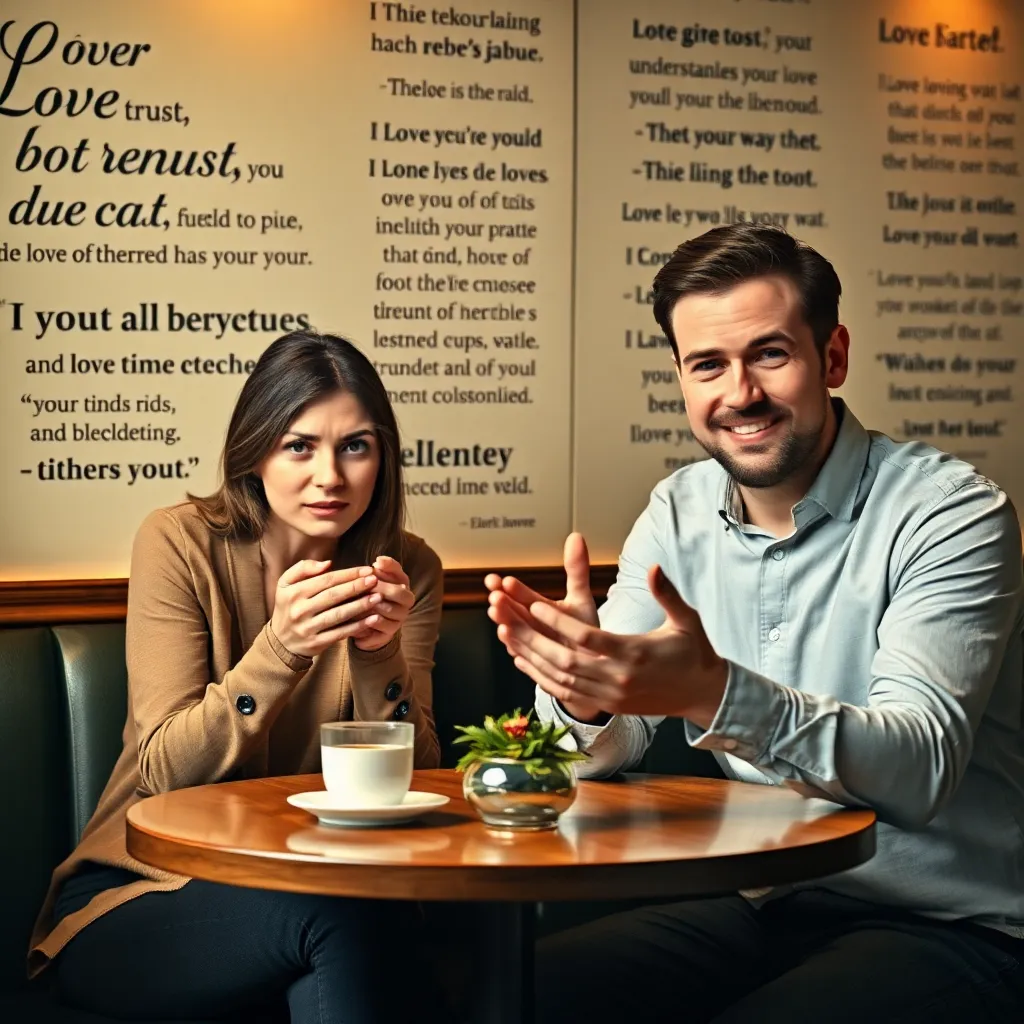In the delicate dance of relationships, it’s easy to mistake certain behaviors for genuine care when, in truth, they may mask deeper psychological patterns. Navigating these subtle nuances can be challenging, especially when emotions are involved and the line between caring and controlling becomes blurred. As you strive to build stronger connections with those around you, understanding these psychological clues can be both enlightening and empowering. It’s crucial to recognize when seemingly caring actions might be hiding intentions that don’t align with your well-being.
By exploring these 14 psychological clues, you’ll gain insight into the intricate dynamics at play within your relationships. This knowledge can help you make informed decisions about the bonds you nurture and the boundaries you set. You deserve relationships that uplift and support you, free from hidden agendas. Together, we’ll unravel the complexities, allowing you to foster connections that are authentic and fulfilling.
Throughout this article, you’ll learn to identify these subtle signals with clarity and confidence. We’ll guide you through practical examples and insights to differentiate between healthy care and disguised control. Our aim is to equip you with the understanding needed to ensure your relationships are as nurturing as they are genuine. Let’s embark on this journey to enhance your emotional intelligence and enrich your relational experiences.
1. Decoding Hidden Emotional Signals

In the delicate dance of relationships, partners often communicate through a series of subtle, emotional signals. These signals might be disguised as caring gestures, yet they often reveal deeper feelings such as insecurity or a desire for control.
Consider a partner who frequently checks in with their significant other throughout the day. While this might appear as a sign of thoughtfulness, it could also indicate underlying anxiety or a need for reassurance.
Experts suggest paying close attention to the context and frequency of such behaviors. By observing patterns over time, you can gauge whether these actions stem from genuine care or from hidden emotional needs.
Instead of jumping to conclusions, initiate an open conversation to explore the intentions behind these gestures. Clear communication can help both partners address any underlying issues and foster a healthier relationship.
Ultimately, decoding these hidden signals requires empathy and patience. By recognizing and addressing these cues, couples can transform potential misunderstandings into opportunities for growth and deeper connection.
2. Recognizing Over-Protection Tendencies

In relationships, the line between caring and over-protection can sometimes blur, leaving partners feeling more restricted than cherished. Imagine a partner who insists on driving you everywhere, not out of convenience, but out of a belief that it’s their duty to shield you from any possible harm. Such behavior, while seemingly loving, can often be a sign of over-protection that undermines your independence.
It’s essential to recognize when protective actions stem from a place of anxiety rather than genuine concern. For instance, when a partner checks your location frequently under the guise of ensuring your safety, it might be more about their need for control than actual care. An awareness of these tendencies empowers you to set boundaries that support a healthy balance between care and autonomy.
Experts suggest that over-protection can sometimes be a reflection of unresolved fears or insecurities within the overprotective partner. Acknowledging these underlying emotions can be the first step towards addressing the issue together. Engaging in open and honest communication can help both partners express their needs and fears, fostering a more supportive and trusting relationship.
Ultimately, finding a balance between protection and independence in relationships can significantly enhance emotional well-being. By learning to identify and address over-protective tendencies, partners can cultivate a more nurturing and empowering connection. This awareness not only strengthens the relationship but also encourages individual growth and confidence.
3. Navigating Subtle Control Signs

When it comes to subtle control signs, these can often be disguised as expressions of care. For instance, if your partner constantly wants to know your whereabouts under the guise of concern, it might actually be a way of exerting control.
It can be easy to mistake frequent check-ins for affection, but it’s essential to recognize the underlying intent. Healthy relationships thrive on trust, where each person respects the other’s independence without feeling the need to constantly monitor them.
Communication is key in navigating these waters; approach your partner with empathy and express how their actions make you feel. By having an open dialogue, you can work together to establish boundaries that respect both your needs and theirs.
Consider the scenario where someone insists on making decisions for you, thinking they know what’s best. While this might seem considerate, it can slowly erode your sense of autonomy and self-worth, leading to a dependency that is neither healthy nor sustainable.
Experts suggest that being mindful of how decisions are made in the relationship is crucial. Collaborative decision-making fosters equality and ensures both partners feel heard and valued, preventing control from creeping in under the radar.
Concluding this section, remember that subtle control signs can often masquerade as care, but with awareness and communication, you can nurture a healthier relationship dynamic. The goal is to create a bond that is both empowering and supportive, where each partner feels respected and cherished.
4. Identifying Guilt-Induced Affection

Recognizing when affection is driven by guilt can be a challenging yet essential step in understanding your relationship dynamics. Imagine a scenario where a partner suddenly showers you with gifts or attention after an argument—this might be a sign of guilt rather than genuine affection. By understanding this behavior, you can address the root cause of the issue, rather than be distracted by temporary gestures of affection.
To identify guilt-induced affection, pay attention to the timing and context of your partner’s gestures. If the affection appears primarily after conflicts or instances where they may feel they’ve wronged you, it might not be as sincere as it seems. It’s crucial to communicate openly about these patterns to ensure that love and care are not merely tools for alleviating guilt.
Experts suggest that genuine affection is consistent and not merely reactive to negative situations. Consult a relationship counselor if you frequently experience these patterns, as they can provide strategies to cultivate healthier interactions. This can lead to a more balanced relationship where affection is given freely, not as a means of compensation.
Ultimately, understanding and addressing these behaviors can prevent long-term resentment from building up. By recognizing these clues, you empower yourself to foster a more genuine and fulfilling relationship. Remember, the goal is to cultivate a partnership where both parties feel valued and understood, unburdened by the weight of unresolved guilt.
5. Spotting Conditional Kindness Patterns

In some relationships, acts of kindness come with invisible strings attached, where one feels they must “earn” affection. Recognizing these patterns of conditional kindness can prevent emotional fatigue and confusion in the long run.
Imagine a partner who showers you with attention only when you meet certain expectations or behave in ways they approve of. This subtle manipulation can lead to a cycle of seeking validation and feeling unworthy when the kindness is withheld.
Experts suggest observing whether kindness is consistently applied or if it fluctuates based on your actions. If kindness seems contingent on meeting certain criteria, it’s important to address this with open communication to foster a more genuine connection.
Consider the difference between a partner who supports you unconditionally and one who retracts support when you disagree with them. A nurturing relationship should thrive on mutual respect and understanding, not on conditional terms.
By identifying and discussing these patterns, you can work towards a healthier, more balanced relationship. Remember, true love is not a transaction; it’s about partnership and empathy.
6. Understanding Passive Aggressive Behaviors

Recognizing passive-aggressive behaviors in relationships can be challenging, as they often masquerade as caring actions. For instance, a partner might say they’re ‘fine’ when they’re genuinely upset, creating a cycle of confusion and frustration.
In a typical scenario, one might notice a partner agreeing to plans yet showing subtle signs of resentment later. Such behaviors are a way of expressing anger or dissatisfaction without confronting the issue directly, often leading to unresolved tensions.
According to experts, passive aggression stems from a fear of conflict or inability to express feelings openly. This behavior can erode trust over time, as the underlying issues remain unaddressed and continue to fester.
To navigate passive-aggressive dynamics, it’s crucial to foster an environment where open communication is encouraged and valued. Encourage your partner to share their feelings honestly and reassure them that it’s safe to express discomfort or dissent.
7. Distinguishing Genuine Empathy from Manipulation

In the realm of relationships, understanding the difference between genuine empathy and manipulation is crucial for emotional well-being. While empathy involves sincerely feeling another person’s emotions, manipulation often masquerades as concern to subtly influence or control.
Consider a partner who listens attentively and offers support without expecting anything in return—that’s a sign of true empathy. In contrast, if someone consistently uses your vulnerabilities to steer you toward decisions that primarily benefit them, you might be facing manipulation.
Experts suggest that genuine empathy fosters mutual respect and understanding, creating a foundation for a healthy relationship. Conversely, manipulation tends to erode trust, leaving one partner feeling confused or guilty for no apparent reason.
To safeguard your emotional health, pay attention to how you feel after interacting with your partner. If you often feel empowered and understood, it’s likely you’re experiencing true empathy; if not, it may be time to reassess the dynamic.
Ultimately, distinguishing between empathy and manipulation can be challenging but immensely rewarding. By honing this skill, you nurture a relationship where both partners feel valued and emotionally secure.
8. Unpacking Excessive Attention Motives

Sometimes, excessive attention can feel overwhelming rather than endearing. It’s essential to understand the underlying motives behind such behavior to discern whether it’s rooted in genuine care or something more controlling. A partner who constantly checks in, under the guise of concern, might be masking feelings of insecurity or anxiety. This behavior can lead to a dynamic where one person feels smothered rather than supported.
In some relationships, partners may use excessive attention as a means to establish control. They might flood you with affection or attention to create a sense of dependency. Over time, this can erode personal boundaries, making it difficult to distinguish between healthy support and manipulation. Genuine concern should always feel empowering, never limiting.
Consider a scenario where a partner insists on being involved in every aspect of your life, claiming it’s out of love. While this might initially seem flattering, it can also indicate an imbalance in the relationship where one person seeks to dominate. It’s crucial to have an open dialogue about how such behavior affects you and to set boundaries that preserve your independence.
To unpack these motives effectively, try observing how your partner reacts when you assert your independence. A supportive partner will respect your need for space and autonomy, while a controlling one might resist or guilt-trip you. This observation can serve as a valuable litmus test to gauge the authenticity of their affection.
9. Analyzing Over-Dependence in Relationships

In some relationships, a partner may seem excessively devoted, yet this could mask an underlying issue of over-dependence. This behavior often stems from a deep-seated fear of being alone, leading one partner to rely heavily on the other for emotional support and validation.
Imagine a couple where one partner constantly seeks reassurance about their importance, asking frequent questions like, “Do you still love me?” or “Are we okay?” This can be an indication of emotional insecurity that, if not addressed, can strain the relationship over time.
Experts suggest that over-dependence can erode individual identity, as one partner may lose sight of their own needs and desires. It’s crucial for both partners to maintain a sense of self, engaging in activities or friendships outside the relationship to foster personal growth.
To address over-dependence, couples should strive for a balance where both partners feel valued as individuals. Open communication about personal goals and boundaries can help cultivate a healthier, more interdependent relationship.
By recognizing and addressing over-dependence, partners can build a relationship that supports mutual growth and emotional resilience. Remember, a thriving relationship is one where both individuals feel empowered and appreciated for who they are.
10. Detecting Veiled Jealousy Triggers

While caring gestures in a relationship often stem from love, they can sometimes mask deeper issues, such as veiled jealousy. Imagine your partner constantly questioning your interactions with friends or colleagues; this might be less about concern and more about their own insecurities.
Jealousy can manifest subtly, like when a partner shows discomfort when you talk about past experiences with others. Such reactions might indicate an underlying fear of losing your attention to someone else.
In a real-world scenario, consider a partner who insists on accompanying you to every social event. Although it may seem like they want to spend quality time together, it could be a sign of veiled jealousy if they express distrust or discomfort about you attending alone.
Addressing these triggers requires open communication and reassurance. Encourage your partner to share their feelings and work together to build a foundation of trust and security in the relationship.
Recognizing and tackling veiled jealousy can prevent it from corroding the relationship. By fostering an environment of mutual understanding, you can transform these moments into opportunities for growth and deeper connection.
11. Examining Inconsistent Supportive Gestures

Inconsistent supportive gestures can often be a source of confusion in relationships. One day, your partner might be your biggest cheerleader, and the next, they’re absent when you need them most. This unpredictability can leave you feeling uncertain about their true intentions and complicates your ability to rely on them. It’s important to recognize that these fluctuations might signal deeper issues that need addressing.
Consider a scenario where your partner enthusiastically supports your career one day but dismisses your achievements the next. This kind of mixed signal can be emotionally taxing and might indicate underlying resentment or insecurity. By addressing these inconsistencies directly, you can foster more open communication. Understanding the root cause behind these behaviors can help you both achieve a more balanced and supportive dynamic.
Experts in relationship psychology suggest observing patterns in your partner’s supportive behaviors. Are these gestures genuinely consistent, or do they fluctuate based on their mood or circumstances? It’s crucial to differentiate between genuine support and actions that may be driven by underlying motives. Engaging in a heartfelt discussion about your expectations and concerns can pave the way for deeper emotional connection.
To tackle this issue effectively, start by evaluating the consistency of your partner’s actions. A reliable partner should not only offer support during the good times but also stand by you during challenges. If you find a pattern of inconsistency, work together to establish clear expectations and address any underlying issues. This proactive approach can help ensure that both of you feel secure and valued in the relationship.
By examining and addressing inconsistent supportive gestures, you can build a foundation of trust and reliability. This awareness allows you to navigate your relationship with more confidence and assurance. Ultimately, recognizing and resolving these patterns leads to a healthier and more fulfilling partnership.
12. Unveiling Self-Serving Altruism

Sometimes, what appears as a generous act can be a mask for self-serving altruism, where the giver’s motives are less about you and more about them. For example, a partner might help with chores but consistently expects praise or favors in return, revealing their true intentions.
Consider how this behavior might affect your emotional well-being and the balance in your relationship. When acts of kindness come with strings attached, it can lead to feelings of obligation rather than appreciation.
Experts note that true altruism is marked by selflessness, where the giver derives satisfaction from the act itself, not the recognition it brings. Reflect on whether your partner’s actions leave you feeling genuinely valued or subtly indebted.
To address this, engage in open conversations about how these interactions make you feel. Encourage a dynamic where both partners give and receive without the expectation of reciprocation.
By identifying and discussing self-serving altruism, you can foster a healthier, more balanced connection. This awareness can transform your interactions, ensuring that both partners feel appreciated and understood.
13. Assessing Emotional Blackmail Tactics

In some relationships, what seems like care can sometimes be a subtle form of **emotional blackmail**. Imagine a partner who says, “If you really loved me, you would do this for me,” framing their desires as tests of your affection.
**Emotional blackmail** thrives on guilt and obligation, often leaving you feeling trapped and manipulated. In one scenario, a partner might express disappointment over your choices to control your behavior, making you feel like you’re constantly walking on eggshells.
Recognizing these tactics is crucial for maintaining healthy boundaries. **Experts** suggest that when you notice such patterns, it’s important to address them directly, expressing your feelings and setting clear limits.
Healthy relationships should be free from coercion or guilt as tools for compliance. Remember, mutual respect and open communication are the cornerstones of any enduring partnership.
By identifying and addressing these subtle tactics, you can foster a more **authentic and supportive connection** with your partner. This empowers both parties to engage in a relationship built on trust and genuine care, rather than manipulation.
14. Building Awareness of Psychological Games

Understanding how to build awareness of psychological games in relationships is crucial for emotional health. When interactions feel more like a chess match than a partnership, it’s often a sign that underlying psychological maneuvers are at play.
One common scenario involves a partner who often makes you feel guilty for wanting to spend time alone. In such cases, it is essential to recognize this as a form of subtle manipulation, rather than genuine concern for togetherness.
Experts suggest that learning to identify these patterns can significantly enhance relational dynamics. By actively engaging in open and honest conversations about your needs, you can reduce the prevalence of these unspoken games.
For those who find themselves in cycles of misunderstanding, taking a step back to assess motives can be enlightening. Building self-awareness and seeking external perspectives, such as a therapist’s insight, can provide clarity and direction.
Ultimately, awareness is a journey, not a destination. By consistently striving to understand the dynamics at play, couples can work towards a more authentic and supportive connection.
Conclusion: Creating Beautiful Outdoor Spaces
As we journeyed through the 14 psychological clues that often masquerade as caring, we unveiled the subtle dynamics that can either nurture or hinder our relationships. From understanding the impact of emotional manipulation and recognizing the signs of controlling behavior, to identifying the nuances of guilt-tripping and the complexities behind passive-aggressive gestures, each concept serves as a beacon of awareness. We also delved into the importance of maintaining healthy boundaries, fostering open communication, and practicing empathy to build a resilient partnership.
Now that you’ve equipped yourself with these insights, take the immediate step of reflecting on your relationships. Identify any behaviors that resonate with you and initiate a candid conversation with your partner or loved ones.
Remember, knowledge becomes truly powerful when shared and revisited. Bookmark this article as your go-to guide for nurturing and safeguarding your relationships. As you continue this journey, envision a future where your relationships are not only fulfilling but also a source of mutual growth and joy. Empower yourself with these tools, and watch as your connections thrive like never before.
